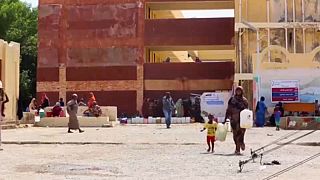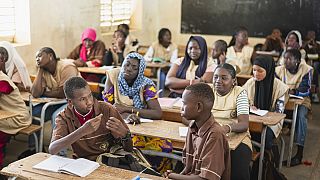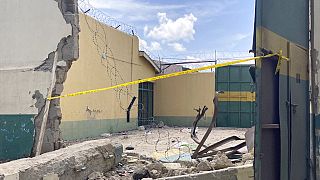Nigeria
A decade on from the Chibok school kidnapping, abductions in northwest Nigeria are still an all too frequent occurrence.
The gunmen who kidnapped Jennifer Peter and dozens of her peers from a school in March 2021 returned months later to attack another school in her state in northwestern Nigeria.
The second time, they seized over 100 children as they cried amid gunfire.
One of them was Jennifer’s then 10-year-old cousin, Treasure.
Paying a ransom didn't work for Treasure, the only captive held back from the school abduction in July 2021.
Treasure eventually escaped captivity in November after more than two years in the notorious forests that serve as hideouts for armed gangs in the West African nation’s conflict-battered north.
Two more people in the family were later kidnapped, including Jennifer’s uncle who was held after he went to deliver the ransom asked for, all of which later swelled to more than seven million naira (5,545 US dollars).
They sold most of what they had for Treasure and the rest to regain their freedom, from their car and land to even the assets their late father left behind.
But their lives were changed forever.
Financial devastation
“Since after that incident, I have not recovered, my family has not recovered mentally, financially,” said Jennifer, 26, her mother sobbing beside her at their residence in Kaduna.
Jennifer rarely sleeps well even though it's been almost three years since she was freed by her kidnappers.
No one in their family recovered after their experiences with the kidnap crisis.
Her mother, a food trader, is finding it hard to raise capital again for her business after most of her savings and assets inherited from her late husband were gathered to raise the kidnap ransoms.
"I don't have anything again," said Mary Peter, who has had to deal with five kidnapped family members including Jennifer and Treasure at different times. "I feel like people reject us.”
Nigerian lawmakers last year outlawed ransom payments but desperate families continue to pay as the kidnappers are known to be ruthless, sometimes shooting dead their victims when their relatives delay ransom payments often delivered in cash at designated locations.
Criminal gangs
Since the Chibok abductions April 2014, when Islamic extremists kidnapped 276 schoolgirls, at least 1,500 students have been kidnapped, as armed groups increasingly find in them a lucrative way to fund other crimes and control villages in the nation's mineral-rich but poorly policed northwestern region.
It has become a fast-growing lucrative business amid rising poverty and unemployment levels in Africa’s most populous country with schoolchildren often targeted, the latest in March 2024 when 137 children were marched from their classrooms into nearby forests in Kaduna’s Kuriga town.
Unlike the Islamic extremists that staged the Chibok kidnapping, the criminal gangs terrorising villages in northwestern Nigeria are mostly former herdsmen who were in conflict with farming host communities.
Aided by illegal arms smuggled through Nigeria’s porous borders, they operate under dozens of groups with no centralized leadership structure, their attacks driven mainly by the economic motive to make money from ransoms to buy more guns, control resources in the mineral-rich region and dominate villages where security and government are largely absent.
Worsening situation
Some analysts think the situation is getting worse despite strategies put in place to ensure that incidents are mitigated, according to Nigerian security and counter-terrorism expert, Dickson Osagie.
The security lapses that resulted in the Chibok kidnapping also remain in place in many schools, according to a recent survey by the United Nations children’s agency’s Nigeria office which found that only 43% of minimum safety standards are met in over 6-thousand surveyed schools.













00:44
Haiti: Former PM Henry submits resignation of cabinet, transitional council takes power
00:53
Mali: Dozens of passengers abducted by suspected jihadists near Bandiagara freed
01:33
Haiti: Health system near collapse as medicine dwindles and gangs attack hospitals
01:09
Mali: More than 110 civilians kidnapped by "suspected jihadists"
01:47
Environmental Volunteering: Activists gather in Lagos ahead of World Earth Day
00:39
Nigerian chess master plays for 60 hours in bid to set new world record